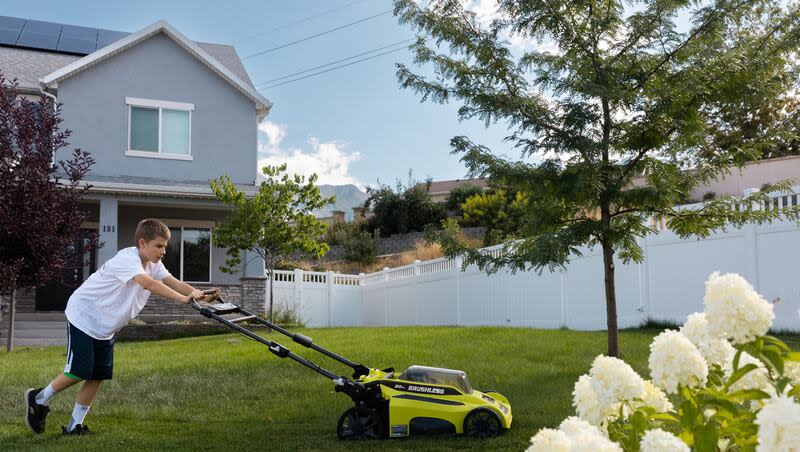Why allergy season seems to be getting worse

If you have the sense that your springtime allergies keep getting worse, be assured it’s not just in your head — though it’s certainly there, too, with runny nose and sinus headaches and red, itchy and maybe even teary eyes.
The Asthma and Allergy Foundation of America reports that “pollen seasons start earlier, last longer, and are more intense.” In fact, the group notes, allergies are the sixth leading cause of chronic illness in the U.S. In January 2023, the Centers for Disease Control and Prevention reported that nearly one-third of adults and more than one-fourth of children in the U.S. have allergies, including 25.7% of adults who have seasonal allergies. White adults are more likely to have seasonal allergies (28.4%) than Black (24%), Hispanic (18.8%) and Asian (17%) adults.
Among children, nearly 1 in 5 have seasonal allergies, which are more common in boys (20%) than in girls (17.7%).
And an article for the Association of Medical Colleges notes that “warming temperatures and other environmental factors have made seasonal allergens such as tree pollen, mold and other spores worse over the past several decades. Not only are allergens thriving for longer periods than in the past — extending the pollen season by as much as three weeks in some parts of North America — they’re also reproducing at hight rates, intensifying allergy symptoms for many through out the longer allergy season.”
The article noted that computer models suggest climate change “could significantly increase airborne pollen loads, even in areas that now have low loads, by 2050.”
Allergy misery
Allergies occur when the immune system sees a foreign substance in the body and declares full-out war, even against a harmless substance. When the immune system detects pollen, for instance, it lets loose a barrage of histamines, causing inflammation and mucus production. So your nose runs, your eyes itch and you cough.
Writes Bridget Balch for the association, “Though seasonal allergy symptoms are caused by the immune system response, they are triggered by allergens in the environment. Pollen is produced naturally as a means of reproduction for a variety of plants, but human activity — such as creating air pollution, using non-native and allergen-producing plants in landscaping, and the increasing temperatures caused by climate change — all contribute to the exacerbation of seasonal allergies.”
Warm weather extends the season for blossoms. It’s believed that air pollutants make pollen a more potent allergen. And those beautiful plants you so lovingly set in your yard? They can also increase the amount of pollen blowing your way.
Per CNN, “Beyond more potent pollen, the sheer quantities of it may be causing a problem. Experts think more exposure to pollen equals more chances to be sensitized, which equals more allergies.”
Why is pollen so high?
A recent study looked at 30 years’ records of pollen counts in the U.S., matching the counts with temperature fluctuations. Seasonal allergy severity and temperature seemed to match up. As CNN noted, “As the weather has warmed, pollen season has started about 20 days earlier and lasted eight days longer. There’s also been about 20% more pollen produced annually, mostly due to trees cranking out more of the yellow-green stuff. The study authors found the trends accelerating over time, with the biggest increases in the most recent years. The trends get more pronounced as you go north.”
Bayer.com reports that urban living raises pollen counts, too, because all that concrete and impermeable structure creates “heat islands, areas several degrees warmer than surrounding rural areas. In these, trees and plants can turn green earlier and stay green longer during the year and thereby produce more pollen.”
Bayer subscribes to the “plant sexism” theory, as well, noting that “many cities planted male-only trees as they don’t produce the seeds, fruits or pods that can ‘litter’ the streets. They do, however, produce pollen and lots of it. And with little female trees to receive that pollen, city air and streets can become filled with pollen during hay fever season.”
Relief from allergy symptoms
That’s the bad news for allergy sufferers. The good news is there are ways to manage symptoms.
Reduce exposure. “Close windows so allergens don’t come inside,” per The New York Times. You’ll also want to rinse off if you’ve been outdoors. And don’t store the clothes you wore working outside in your bedroom.
Try an over-the-counter remedy. There are multiple remedies for seasonal allergies, including both antihistamines and steroids, which are usually nasal sprays. The antihistamines should be used only as needed. Never exceed the recommended dose for either one. And watch the warning labels. Some cause sedation, while others can make the heart race or raise blood pressure, which is why they shouldn’t be used in excess. The nasal spray can be used daily throughout allergy season, perhaps even starting a little early, but follow the directions for how much. Too much is bad.
Stay inside on dry, windy days. That’s when Mayo Clinic says allergens are blown all over. Right after a rain is probably the best time to go outside, the article adds.
Vacuum often with a machine that has a high-efficiency particulate air, or HEPA, filter.
Rinse your sinuses. Saline solution is cheap and fast to relieve nasal congestion and it flushes allergens from your nose.
Wear a face mask outside on high pollen days.
See an allergy specialist. If those don’t help, see a specialist to see if allergy shots or prescription medication can provide some relief.
There are ways to determine whether you have allergies — and you can develop seasonal allergies at any time. The University of Rochester Medical Center says if you have fever, body aches or severe headaches that aren’t caused by nasal congestion, it’s probably not an allergy. If pollen counts are high and your nasal passages, eyes and lungs are irritated, it could be allergies.

